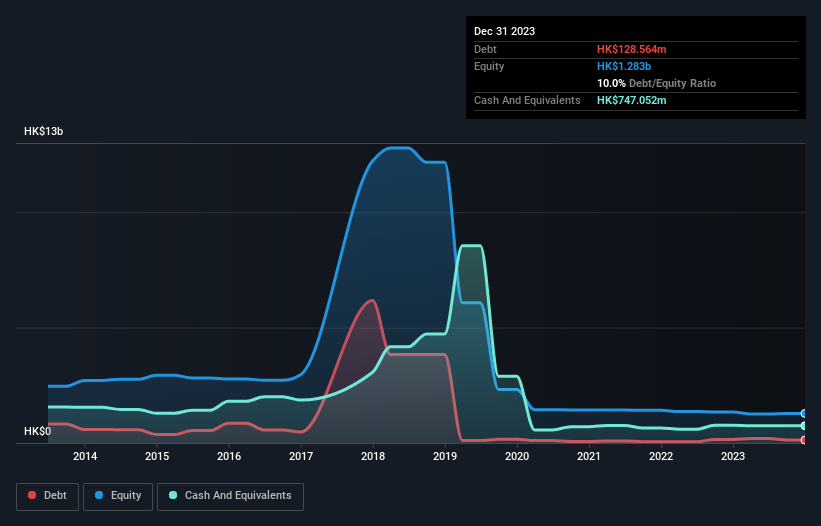
The external fund manager backed by Berkshire Hathaway's Charlie Munger, Li Lu, makes no bones about it when he says 'The biggest investment risk is not the volatility of prices, but whether you will suffer a permanent loss of capital.' So it might be obvious that you need to consider debt, when you think about how risky any given stock is, because too much debt can sink a company. As with many other companies Tysan Holdings Limited (HKG:687) makes use of debt. But the more important question is: how much risk is that debt creating?
When Is Debt A Problem?
Debt and other liabilities become risky for a business when it cannot easily fulfill those obligations, either with free cash flow or by raising capital at an attractive price. Ultimately, if the company can't fulfill its legal obligations to repay debt, shareholders could walk away with nothing. While that is not too common, we often do see indebted companies permanently diluting shareholders because lenders force them to raise capital at a distressed price. Of course, plenty of companies use debt to fund growth, without any negative consequences. When we examine debt levels, we first consider both cash and debt levels, together.
Check out our latest analysis for Tysan Holdings
What Is Tysan Holdings's Debt?
As you can see below, Tysan Holdings had HK$128.6m of debt at December 2023, down from HK$152.5m a year prior. But it also has HK$747.1m in cash to offset that, meaning it has HK$618.5m net cash.

A Look At Tysan Holdings' Liabilities
Zooming in on the latest balance sheet data, we can see that Tysan Holdings had liabilities of HK$510.4m due within 12 months and liabilities of HK$121.1m due beyond that. Offsetting this, it had HK$747.1m in cash and HK$782.5m in receivables that were due within 12 months. So it actually has HK$898.1m more liquid assets than total liabilities.
This luscious liquidity implies that Tysan Holdings' balance sheet is sturdy like a giant sequoia tree. Having regard to this fact, we think its balance sheet is as strong as an ox. Succinctly put, Tysan Holdings boasts net cash, so it's fair to say it does not have a heavy debt load! There's no doubt that we learn most about debt from the balance sheet. But it is Tysan Holdings's earnings that will influence how the balance sheet holds up in the future. So when considering debt, it's definitely worth looking at the earnings trend. Click here for an interactive snapshot.
In the last year Tysan Holdings wasn't profitable at an EBIT level, but managed to grow its revenue by 9.3%, to HK$2.7b. We usually like to see faster growth from unprofitable companies, but each to their own.
So How Risky Is Tysan Holdings?
While Tysan Holdings lost money on an earnings before interest and tax (EBIT) level, it actually generated positive free cash flow HK$48m. So although it is loss-making, it doesn't seem to have too much near-term balance sheet risk, keeping in mind the net cash. The next few years will be important as the business matures. When analysing debt levels, the balance sheet is the obvious place to start. But ultimately, every company can contain risks that exist outside of the balance sheet. For instance, we've identified 2 warning signs for Tysan Holdings (1 doesn't sit too well with us) you should be aware of.
When all is said and done, sometimes its easier to focus on companies that don't even need debt. Readers can access a list of growth stocks with zero net debt 100% free, right now.
Valuation is complex, but we're here to simplify it.
Discover if Tysan Holdings might be undervalued or overvalued with our detailed analysis, featuring fair value estimates, potential risks, dividends, insider trades, and its financial condition.
Access Free AnalysisHave feedback on this article? Concerned about the content? Get in touch with us directly. Alternatively, email editorial-team (at) simplywallst.com.
This article by Simply Wall St is general in nature. We provide commentary based on historical data and analyst forecasts only using an unbiased methodology and our articles are not intended to be financial advice. It does not constitute a recommendation to buy or sell any stock, and does not take account of your objectives, or your financial situation. We aim to bring you long-term focused analysis driven by fundamental data. Note that our analysis may not factor in the latest price-sensitive company announcements or qualitative material. Simply Wall St has no position in any stocks mentioned.
About SEHK:687
Tysan Holdings
An investment holding company, provides foundation piling and site investigation services in Hong Kong.
Excellent balance sheet with acceptable track record.
Market Insights
Community Narratives



